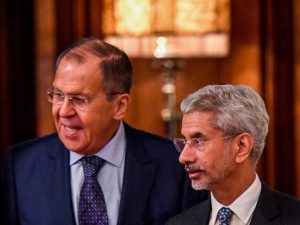
Russian Foreign Minister Sergey Lavrov has endorsed India’s membership for a permanent seat at the United Nations Security Council during the 77th Session of the UN General Assembly (UNGA).
In his address at UNGA, Mr Lavrov called India and Brazil “worthy candidates” for the Security Council membership and argued that “the UN and Security Council have to be aligned to contemporary realities”. He called for making the Security Council more democratic through broadening the representation of countries from Africa, Asia and Latin America. “We note India and Brazil in particular as key international actors and worthy candidates for permanent membership within the Council”, Mr Lavrov said.
In a separate press conference, he called “India and Brazil as strong candidates as they are leading international players”. “I mentioned India and Brazil for a single reason. They have long officially advanced their candidatures”, said Mr Lavrov.
India, the world’s largest democracy and the fifth largest economy, has been pushing hard for a permanent seat in UNSC.
At present the UNSC comprises five permanent members called P5 and 10 non non-permanent members which have two year terms. The existing P5- Russia, the UK, China, France and the United States – enjoy the veto power, which is denied to non-permanent members. For a long time India, Japan, Brazil and Germany have been demanding the restructuring of the Security council to reflect the wider world which has transformed since 1945 when the Security Council was formed.
Despite being a part of the western alliance and a member of the Quad, India has taken a neutral stand on the Russian invasion of Ukraine. It has refused to condemn the war and despite mounting pressure from the West, New Delhi has been importing Russian oil. Prime Minister Narendra Modi is one of the few world leaders who has been engaging Russian president Vladimir Putin directly as was seen in the recently held Shanghai Cooperation Organization (SCO) summit at Samarkand.
Mr Lavrov opposed the inclusion of any country from the western world to the Security Council as “they can provide absolutely nothing to the Council” and “they are all following the orders of the United States.”
At the 77th UN General Assembly meeting, India’s External Affairs Minister S. Jaishankar argued strongly for a reformed U.N.-led multilateral system. In New York, Mr Jaishankar participated in a meeting entitled ‘Reinvigorating Multilateralism and Achieving Comprehensive Reform of the UN Security Council with L.69, a grouping of developing countries from Africa, Latin America and the Caribbean, Asia and the Pacific united by the common cause of achieving the lasting and comprehensive reform of the United Nations Security Council. The meeting between Jaishankar and L.69 resulted in a ‘Call to Action’ joint statement on reform.
“We reaffirm that adapting the United Nations to the contemporary world realities necessarily requires urgent and comprehensive reform of the Security Council, the principal organ for international peace and security” the statement said. The statement expressed concerns over the “lack of progress” at UNSC reform and warned that it would have “serious implications” not just for the relevance of such institutions but also for global peace and security.
“We have full faith in the principles of the United Nations, in its charter, and in our belief in reformed multilateralism as key to shared goals of the world”.
Political observers believe that Russia is keen to keep India in good humor despite New Delhi’s recent remarks against the war. Moscow knows that New Delhi is a major western ally of the West in South Asia and by keeping the tie smooth with the South Asian republic it will not be possible to have any large scale international consolidation against it. Of late New Delhi has been demonstrating an open discomfort with the Ukraine war, with Mr Modi in his recent meeting with Putin at the SCO summit asked him to “move onto a path of peace” and reminded him of the importance of “democracy, diplomacy and dialogue”.
“I know that today’s era is not of war and we have talked to you many times over the phone on the subject that democracy and diplomacy and dialogue are all these things that touch the world”, Mr Modi told Mr Putin in Samarkand. Mr Lavrov’s statement at the UN came within a week of Modi-Putin’s meeting in Uzbekistan.
Author Profile
- India Writes Network (www.indiawrites.org) is an emerging think tank and a media-publishing company focused on international affairs & the India Story. Centre for Global India Insights is the research arm of India Writes Network. To subscribe to India and the World, write to editor@indiawrites.org. A venture of TGII Media Private Limited, a leading media, publishing and consultancy company, IWN has carved a niche for balanced and exhaustive reporting and analysis of international affairs. Eminent personalities, politicians, diplomats, authors, strategy gurus and news-makers have contributed to India Writes Network, as also “India and the World,” a magazine focused on global affairs.
Latest entries
 DiplomacyJanuary 5, 2026India walks diplomatic tightrope over US operation in Venezuela
DiplomacyJanuary 5, 2026India walks diplomatic tightrope over US operation in Venezuela India and the WorldNovember 26, 2025G20@20: Africa’s Moment – The Once and Future World Order
India and the WorldNovember 26, 2025G20@20: Africa’s Moment – The Once and Future World Order DiplomacyOctober 4, 2025UNGA Resolution 2758 Must Not Be Distorted, One-China Principle Brooks No Challenge
DiplomacyOctober 4, 2025UNGA Resolution 2758 Must Not Be Distorted, One-China Principle Brooks No Challenge India and the WorldJuly 26, 2025MPs, diplomats laud Operation Sindoor, call for national unity to combat Pakistan-sponsored terror
India and the WorldJuly 26, 2025MPs, diplomats laud Operation Sindoor, call for national unity to combat Pakistan-sponsored terror







